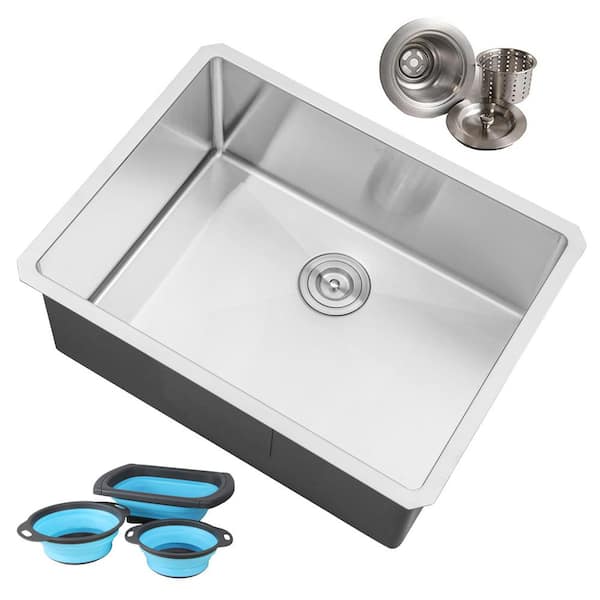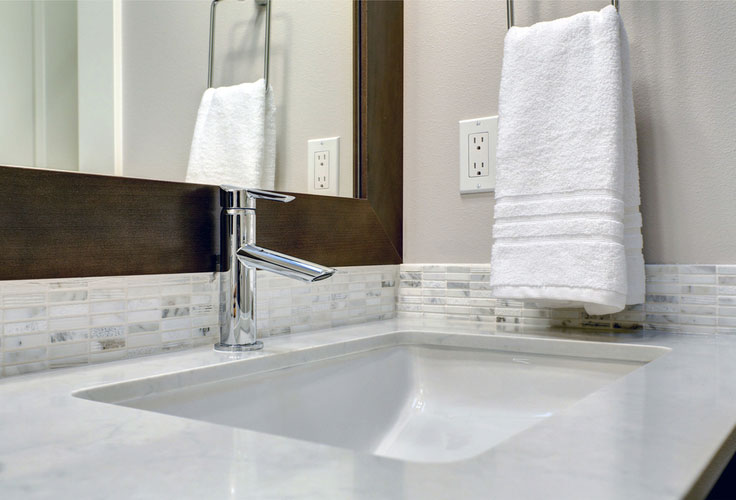When it comes to choosing a stainless steel for your kitchen sink, the gauge of the steel plays a crucial role. The gauge refers to the thickness of the steel, with a lower gauge indicating a thicker steel. In this article, we will explore the differences between 16 gauge and 20 gauge stainless steel and help you determine which one is better for your needs.

Credit: www.homedepot.com
16 Gauge Stainless Steel
16 gauge stainless steel is thicker and more durable compared to 20 gauge. It is commonly used in high-end kitchen sinks due to its strength and ability to withstand heavy daily use. The thicker gauge provides better resistance against dents and scratches, making it ideal for busy kitchens.
Another advantage of 16 gauge stainless steel is its noise dampening properties. The thicker material absorbs more sound, reducing the noise caused by dishes and running water. This can be especially beneficial if you have an open-plan kitchen or if noise is a concern for you.
However, it’s worth noting that 16 gauge stainless steel sinks can be more expensive compared to 20 gauge. If budget is a concern for you, 20 gauge stainless steel may be a more suitable option.

Credit: www.amazon.com
20 Gauge Stainless Steel
20 gauge stainless steel is thinner and lighter compared to 16 gauge. While it may not be as strong as 16 gauge, it still offers good durability and resistance to wear and tear. If you have a small kitchen or a limited budget, a 20 gauge stainless steel sink can be a practical choice.
One advantage of 20 gauge stainless steel is its flexibility. It is easier to mold and shape, allowing for more intricate designs and configurations. This can be particularly appealing if you’re looking for a unique and stylish sink for your kitchen.
However, it’s important to note that 20 gauge stainless steel may be more prone to dents and scratches compared to 16 gauge. If you anticipate heavy usage or have a large family, it may be worth investing in a thicker gauge for added durability.
Frequently Asked Questions On Which Is Better 16 Gauge Or 20 Gauge Stainless Steel?
What Is The Best Gauge For A Stainless Steel Sink?
The best gauge for a stainless steel sink is 16 gauge.
What Is The Best Thickness For A Stainless Steel Sink?
The best thickness for a stainless steel sink is 16 gauge.
Which Is Stronger 16 Or 18 Gauge Stainless Steel?
18 gauge stainless steel is stronger than 16 gauge stainless steel.
Is Higher Gauge Steel Better?
Higher gauge steel is not better. The lower the gauge number, the thicker and more durable the steel. Stick to lower gauge numbers for better quality and longevity.
Conclusion
In conclusion, the choice between 16 gauge and 20 gauge stainless steel ultimately depends on your specific needs and preferences. If you prioritize durability, noise reduction, and have a higher budget, 16 gauge stainless steel is the better option. On the other hand, if you have space constraints, a limited budget, or prefer more flexible design options, 20 gauge stainless steel could be the right choice for you.
It’s important to weigh the pros and cons of both gauges before making a decision. Consider factors such as kitchen usage, budget, and desired aesthetics. Consulting with a professional or visiting a showroom to see and feel the different gauges can also help you make an informed choice.
Remember, both 16 gauge and 20 gauge stainless steel can provide a durable and stylish sink for your kitchen. Choose the gauge that best suits your needs and enjoy the benefits of a high-quality stainless steel sink.




Leave a Reply